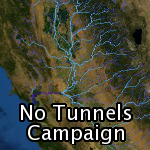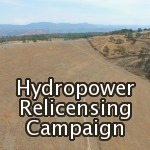Article from Stockton Record.
http://www.recordnet.com/apps/pbcs.dll/article?AID=/20140802/A_NEWS/408020316
By Alex Breitler
August 02, 2014 12:00 AM
The state asked for comments.
And they got ’em.
Officials on Friday said they are beginning the process of wading through 10,000 to 11,000 public comments on the governor’s twin tunnels plan for the Delta.
The deadline to comment was Tuesday.
The letters have not been immediately made public, but some have been posted by an environmental group, and The Record requested copies of other letters this week from more than two dozen interested parties.
While a comprehensive review isn’t yet possible, the letters range from short and passionate entreaties from Delta residents who consider the water diversion a threat to their way of life, to long and technical missives about the benefits and shortcomings of the $25 billion plan.
About 8,000 of the comments are from letters of various kinds, said Brian “BG” Heiland, a supervising engineer with the state Department of Water Resources. A team of consultants is processing the comments now, and then various experts who helped write the plan will begin the enormous task of responding.
“We have to respond to each and every comment,” Heiland said.
Eventually those comments and responses must be included in a final version of the tunnels plan, though Heiland could not say when that would happen.
A glimpse at what some commentators had to say:
» City of Stockton: The plan ignores a possible decline in water quality that could threaten the new $220 million, ratepayer-funded Delta drinking-water plant. Changes in Delta flows could also require costly improvements at the city’s wastewater treatment plant, and construction traffic on Interstate 5 could force local residents onto crowded, deteriorating surface streets. The city also argues that a hit to the agricultural economy in the Delta will reverberate throughout Stockton, leading to abandoned buildings and community blight.
“The residents and communities in the Delta will bear a disproportionate burden,” city officials wrote.
» Port of Stockton: The tunnels plan ignores the port’s intention to deepen the Deep Water Ship Channel to improve passage from San Francisco to Stockton.
» Boaters: The decade-long construction project could constrain or even eliminate access to some Delta waterways.
» Equal access: At least three letters made available by environmental group Friends of the River express concern that minority groups in the Stockton area lack access to details about the plan in their native tongues. The Hmong community, for example, relies heavily on the Delta for fish and representatives worry about health implications that might result from changes in water quality – and whether the people will understand those changes.
» Delta farmers: The decision to build the tunnels was made before the study even began, wrote Stockton attorney Dante Nomellini. The project is a “water grab” that would shift the burden of preserving the Delta from the water exporters to the public, wrote John Herrick, another attorney. Both raise numerous objections.
» Blood-suckers: San Joaquin County’s Mosquito and Vector Control District warns that the conversion of up to 100,000 acres of farms to wetland habitat in the Delta – a complementary part of the tunnels plan – would place mosquitoes within striking distance of neighborhoods, creating a public health risk.
» Land use: The San Joaquin Council of Governments, which has a program to protect native species on working farmland, warns that the conversion to wetlands will lead to generations of farming families losing land to eminent domain, a blow to the region’s ag economy that will also decrease property tax revenue. The council also questions the tunnels’ billing as a “conservation measure” intended to protect the Delta.
» Down south: Various business groups and chambers of commerce in Southern California say the tunnels will reduce conflicts between water users and fish and that a more reliable water supply will preserve more than 1 million jobs.
» Los Angeles-area water suppliers: They’re supportive, with the caveat that if they are going to pay for the tunnels, they want certainty as to how much water they’ll receive from them.
» South Valley farmers: They argue that “failure to act will have devastating consequences.” The Westlands Water District, whose water supply from the Delta has diminished in recent years, says the tunnels should deliver all of the water called for under their contracts when it’s wet enough to make that water available. The Kern County Water Agency says the plan should “clearly define a floor below which water supplies cannot be reduced.”
» Upstream impacts: Water districts upstream of the Delta aren’t as enthusiastic. The East Bay Municipal Utility District, which ships Mokelumne River water to the Bay Area, warns of possible harm to salmon in that stream. A coalition of other upstream water users says the plan appears to be designed to require more water to flow into the Delta, posing a “grave threat” to their own supplies. And water districts relying on streams feeding the San Joaquin River, including Manteca-based South San Joaquin Irrigation District, say it’s still not clear how the tunnels might affect their own operations.
» State water cops: Regulators with the State Water Resources Control Board, which will have to approve any changes in how or where water is diverted, say the tunnels plan is “overly optimistic” when it comes to helping the Delta’s environment. They comment that “significant negative impacts tend to be discounted and positive results tend to be inflated.”
» Environmentalists: The plan won’t save fish, as advertised. The Nature Conservancy – which owns Staten Island, beneath which the tunnels would pass – also warns of harm to sensitive sandhill crane habitat.
Stockton activist Bill Jennings, whose California Sportfishing Protection Alliance submitted voluminous comments along with other environmentalists and Stockton-based Restore the Delta, said the new comments reveal “serious problems” for tunnels supporters, problems that will require far more than a mere tweaking of the plan.
“This isn’t outpatient treatment,” Jennings said. “This is major surgery, frankly with a relatively low prognosis of survival.”









